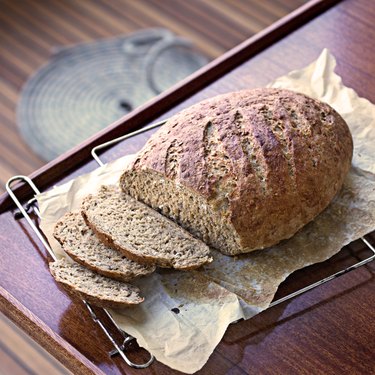
If you only experience stomach pain after eating bread you may have an intolerance towards wheat. If you experience stomach pain after eating bread and other foods you may have a food allergy. A clinical diagnosis is essential for proper treatment of your symptoms. While these two conditions are entirely different, they are treated the same way: eliminating all foods that contain wheat proteins. You should talk with your doctor about your symptoms and undergo certain tests for a proper diagnosis.
Food Allergy
Video of the Day
Bread contains various ingredients that are considered highly allergic foods, such as wheat, milk, eggs and soy. If you're allergic to one or more of the ingredients in the bread you will develop stomach pain and other symptoms within a few minutes of eating the bread. The stomach pain is the result of inflammation in your intestines caused by the production of histamine in the soft tissue of the digestive system.
Video of the Day
Cause
According to MedlinePlus, food allergies are caused by a malfunction of the immune system. The body identifies the proteins in the food as dangerous, when they are actually safe, which causes the body to defend itself by creating histamine, antibodies and other chemicals. These chemicals can result in stomach pain and other common food allergy symptoms, such as nasal congestion, asthma, diarrhea, nausea, skin rashes and hives. In rare cases, stomach pain may be a sign of anaphylaxis, a severe and life-threatening allergic reaction.
Gluten Intolerance
Bread contains gluten, a protein found in wheat. If you're gluten intolerant your immune system reacts to gluten by damaging your intestines, according to the American College of Gastroenterology. Gluten is found in oats, rye, barley and wheat. There is no known reason why the immune system reacts the way it does when you eat gluten, but the damage that's caused can lead to further complications, such as malnourishment and excessive weight loss. The most common symptoms from gluten intolerance include bloating, gas, weakness, changes in bowel movements and weight loss.
Treatment
Treatment for both conditions is the elimination of wheat from your diet. Eating a small amount can trigger reactions from both conditions that can result in unpleasant and dangerous symptoms. Stomach pain that is severe may be a sign of a more serious complication. If you notice blood in your stool or the pain is extreme, call 911 or go to the emergency room.
Is this an emergency? If you are experiencing serious medical symptoms, please see the National Library of Medicine’s list of signs you need emergency medical attention or call 911.